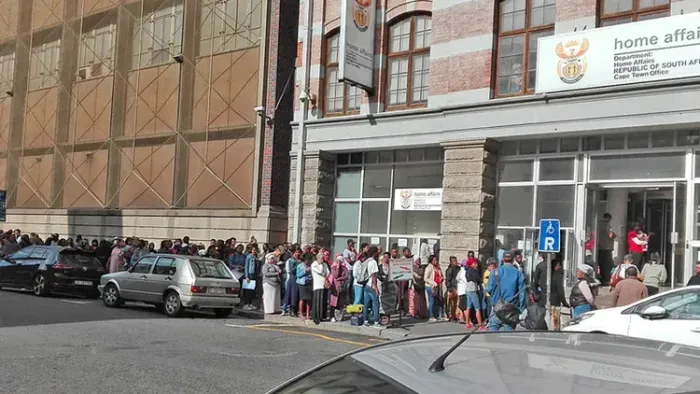
People queue outside a Home Affairs office in the Western Cape.
Image: Supplied
The Department of Home Affairs has reported a major turnaround in its national performance, producing 3.6 million identity documents in the 2024/25 financial year, nearly 1 million more than the previous year but this was not the reality when a local branch was visited this week.
Despite the departments' record-breaking achievements in visa turnaround times and smart ID production, many South Africans say their day-to-day experience at local branches tells a different story.
According to the report, critical skills visas processed on time jumped from 52% to 89%, business visas from 61% to 97%, and general work visas from 10% to 98%.
On Tuesday, IOL visited the Home Affairs Cape Town branch, where the reality on the ground painted a different picture, frustration remains high.
Long queues, malfunctioning booking systems, and uncomfortable waiting conditions continue to define the experience for ordinary citizens.
One woman, Xolelwa Dlamini, who was with her daughter wearing a school uniform said she arrived early in the morning to apply for her daughter's ID, but that the line “moved very slow.”
She said that she has been trying to make an online booking, but “the system kept saying there are no slots available.”
Out of desperation, she arrived early without a booking but found herself standing in a slow-moving queue for hours.
“There are no chairs. We just stand,” she said.
Another woman said she once came to apply for an ID and stood in line for hours before officials told everyone to go home.
“They said there’s a sewer leak inside, and they can’t continue helping. We were told to come back the next day,” she said.
When asked about the contrast between the national improvements and continued frustrations at local branches, Home Affairs spokesperson Adrian Roos said:
“The national statistics are an aggregate of the totals of the offices, so things are dramatically improving. The 28.5% improvement in the output of front-line Home Affairs offices (3.6m-2.8m), is a strong indicator of improved system uptime and the number of South Africans successfully served per day.”
Roos added that the department’s expansion plans aim to make access to services easier.
“With the bank branches rolling out next year, the service network will increase to four times the current footprint and take Home Affairs services closer to South Africans in township and rural areas.”
When asked if the improvements are being felt by ordinary citizens or if they remain administrative, Roos responded: “800,000 extra ordinary South Africans received a smart ID this year = 3000+ per day extra successful applications.”
While acknowledging that some challenges remain, particularly with permanent residence applications, Roos said these take longer because of the extensive investigations involved.
Looking ahead, he said further reforms will focus on freeing up staff to address critical issues such as undocumented South African children.
For now, though, the question remains whether the “staggering improvement” seen on paper will soon be felt in the queues still snaking outside Home Affairs offices across Cape Town.
Cape Argus
Related Topics: